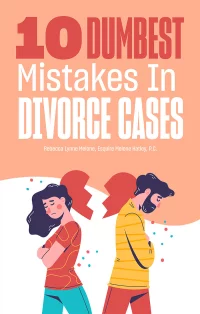
10 Dumbest Mistakes in Divorce Cases
This guide will teach you how to identify and avoid the ten most common mistakes people make in a divorce.
Divorce Attorneys in Virginia

Finding yourself in the midst of a divorce often comes with angst and despair. For most people, it is a difficult time.
Even if you feel a sense of relief about the divorce, it does not mean it is any less stressful or time-consuming. A divorce case can last several months and requires hours of paperwork and decision-making
Custody, visitation, division of financial investments, and determination of who gets the home can be large points of contention. A Virginia family lawyer can work towards equitable distribution and advocate for your rights. As the process moves forward, divorce has a tendency to get even more complicated, especially when children or assets are a part of the decision-making process.
Melone Hatley, P.C. is here for you. Our top-rated Virginia family law firm can provide guidance and protect your rights during difficult times. We have the experience needed to help you through the divorce process.
What To Do When Facing a Virginia Divorce
When you are facing a contested divorce, our team can make sure you understand your rights and options at every step of the process. We pride ourselves on helping clients understand their choices so they can make an informed decision about how to proceed with their case.
We frame every case in terms of what the court would do so that clients understand their range of potential outcomes and can help minimize risk.
Virginia Divorce
Lawyer Near Me
What Are the Requirements to File for Divorce in Virginia?
For any divorce case in Virginia, one party must have been a resident for at least six months before filing the case. If the other spouse has no connection to Virginia, the court may not have jurisdiction to determine any property or support issues between the parties.
The Commonwealth also designates that if the marriage did not produce children, the couple must have been separated for at least six months. Additionally, they must put together a written property settlement agreement before filing for a divorce. Couples who are parents of children must be separated for at least one year before being eligible to file for divorce.
Do I Need a Separation Agreement in Virginia?
No, you do not need a separation agreement to get divorced in Virginia. Courts in Virginia do not grant legal separation. However, creating a separation agreement with your spouse is a good idea if you plan to get a divorce. Check out our blog for more information on this topic. A separation agreement can be a first step toward saving you from a highly contentious court battle when you do not agree on every aspect of the split. For example, It can help determine how you will divide marital property.
Contested Divorce
Contested cases occur for several reasons. First, you and your divorcing spouse may disagree on the grounds for the divorce. Fault-based grounds for divorce in Virginia include cruelty, desertion or abandonment, adultery, or a felony conviction that results in incarceration of at least one year.
- Adultery must be proven by clear and convincing evidence, a higher standard than other grounds for divorce. Proof of adultery may include admissions from the other party, evidence of messages sent, photographs, or videos. Adultery cases can be complex to prove. If proven, adultery can act as a bar to a claim for spousal support.
- Cruelty means physical abuse, and it must be shown to have occurred on more than one occasion. Threats of physical harm can be grounds for a divorce from bed and board, but not a final divorce. Once the parties have been separated for one year, they can petition for a final divorce based on separation.
- Desertion/Abandonment: To prove desertion or abandonment, the spouse must show something more than separation. If a spouse leaves the marital home and all financial obligations behind, the court may rule that they have deserted the marriage.
- Felony Conviction: To get a divorce based on a felony conviction, the conviction must result in a period of incarceration for at least one year. The spouse must also be incarcerated for at least one year.
Next, even if you agree on the grounds for divorce, any number of issues may be disputed between the parties, requiring a contested hearing. The disputes include the financial division of assets and debts, custody and visitation of minor children, and support issues.
A contested case is initiated by filing a complaint for divorce and serving the other side with notice and an opportunity to file a response. In some cases, an initial temporary motion, called a pendente lite motion, may be necessary to get a temporary ruling in place while the parties wait for trial.
During a contested case, the parties can engage in discovery, which is the process of requesting and exchanging financial documents and other requests regarding the evidence to be presented at trial. Both parties are entitled to a disclosure from one another regarding their finances and any other evidence they intend to introduce to the court.
How Long Will a Contested Divorce in Virginia Take?
How long your divorce will take will vary depending on individual circumstances. Contested divorces tend to be complicated and can last up to 18 months.
Divorces that do go through the contested process in the Commonwealth are not eligible to appeal. Any decision made in contested divorces is final 30 days after the judge in the circuit court signs the final divorce decree.

Heading Towards a Contested Divorce?
Couples who have been married a long time, have children, or have accumulated valuable assets typically end up in contested divorce situations. Divorce may even happen well into the later stages of life.
An experienced family law attorney thoroughly versed in Virginia divorce law can present your options and provide honest legal advice on how to proceed.
How Much Does It Cost to File for Divorce in Virginia?
The cost to file for divorce in Virginia is based on various factors, including decisions regarding children, assets, and other specifics of your circumstances.
Generally speaking, divorce attorneys typically charge anywhere between $350 and $375 per hour (with some outlier prices on both ends), but rates usually equate with experience.
Divorce attorneys charging on the lower end may not be as well-versed in Virginia family law and spend more time researching, driving up the hours needed to work on your case. Less experience can also equate to not having a strong “know-how” regarding the Virginia legal process and courts.
The Commonwealth of Virginia has an online calculator you can use to estimate costs and find your district’s fees.
What Are the Benefits of Hiring a Virginia Divorce Lawyer?
Technically, you can represent yourself in court, but this is seldom a good idea, especially if there are child custody disputes or you and your spouse disagree over splitting joint assets. People representing themselves often come out on the losing end of the final divorce decree because they lack the knowledge and experience of the legal system. Benefits of hiring a Virginia divorce lawyer include:
- Bringing valuable experience from many divorce cases of varying circumstances
- Providing objective advice that is not driven by their knowledge of the law and how to best approach your individual situation, not their emotion
- Avoiding common mistakes people often make in divorce situations, especially when high emotions and distress are involved
- Suggesting solutions to settlements that you may not have previously considered
- Helping through difficult decisions by providing unbiased guidance
- Acting as your voice in contentious or difficult circumstances that occur through the divorce process
- Collecting vital evidence to make certain no important details are unintentionally overlooked to help the judge make a fair decision
Furthermore, if your spouse has a divorce lawyer with years of experience, you do not want to go without legal representation. You will want someone with an equivalent or better experience to serve as your advocate so you do not inadvertently agree to something you do not want.
Can You Receive Alimony in Virginia After Divorce?
Virginia does allow spousal support to be awarded when necessary, but it is not a given. When deciding whether alimony should be awarded, the court looks at all information, considers different factors, and evaluates individual circumstances.
Combined, a judge uses these elements to determine if alimony is warranted. For instance, if adultery or other circumstances contributed to the dissolution of the marriage, Virginia courts do consider these events.
Will My Spouse Get Custody of My Children in Virginia?
Determining who gets child custody is decided based on various family law matters. In Virginia, there are two types of custody: physical and legal.
Physical Custody
The parent awarded physical custody lives with the child and oversees their daily care. Primary physical custody means the child lives with one parent, and joint physical custody means the child splits time between both households.
Legal Custody
Legal custody determines which parent takes control of the care of the children and makes decisions relating to their well-being, including health, schools, religion, and other decisions parents typically make when raising their child. In some cases, legal custody is awarded to one parent, but in others, a court splits this responsibility between both parents, regardless of who has physical custody.
What Family Court Judges Consider
The custody of children is determined by what the court deems to be in their best interest. In some cases, a court may appoint a guardian ad litem (GAL) to protect the best interests of a child, and this attorney (or advocate) provides input on custody and visitation matters. Divorce courts also consider the following.
- The child’s age, mental condition, and developmental needs
- The age and mental condition of each parent
- The parental relationships with the child, including past and future roles each parent plays in the child’s life
- The ability of each parent to support the child’s relationship with the other parent (e.g., being collaborative regarding visitation or child’s contact with their former spouse)
- Any history of family abuse or sexual abuse
In Virginia, once a child reaches the age of 14, their opinion is also considered. Depending on the circumstances, a judge may determine whether joint physical and/or legal custody is the best solution. One parent may receive both physical and legal custody or just one of the two.
Visit the following resource to gain more understanding of child custody and our other resource to learn more about how child support is determined.

How Does Property Division Work in Virginia After a Divorce?
After a divorce, you will want to consider your estate planning documents. It is very likely that you will want or need to update your documents to change the beneficiaries and remove your ex-spouse. Since a divorce usually nullifies your ex-spouse as an executor, you may need to name a new executor in their place. If you wish to keep them as an executor, you must modify your estate plan to allow them to maintain this status. Otherwise, you must modify your will, trusts, and other estate plan documents to appoint a new executor. You should also modify your powers of attorney if you no longer wish your ex-spouse to hold that power.
Let Melone Hatley Handle Your Divorce Case
Going through a divorce is a painful and confusing time. It can be difficult to make decisions when going through emotional turmoil. The compassionate family law divorce attorneys at Melone Hatley, P.C. understand exactly what you are going through. We have experience in both civilian and military divorce, as well as all other practice areas relating to Virginia family law.
In addition to offering high-quality legal services, we offer our clients free eBooks, free advice videos, and easy online scheduling.
Founder Rebecca Melone was awarded as a top lawyer by The National Trial Lawyers Top 40 Under 40, along with receiving Super Lawyers Rising Stars awards in 2016, 2017, 2018, 2019, 2020, and 2021. Firm partner Charles Hatley offers long-term “big law” legal experience, having managed offices in Virginia and New York, bringing this experience into the boutique law firm setting. Our tenacity and experience is made evident by our satisfied clients.
We aim to support our clients with high-quality legal services in Fairfax, Arlington, Alexandria, Fredericksburg, Richmond, Virginia Beach, Chesapeake, Norfolk, Prince William County, and all other areas of Northern Virginia and the rest of the Commonwealth.




 757-296-0580
757-296-0580